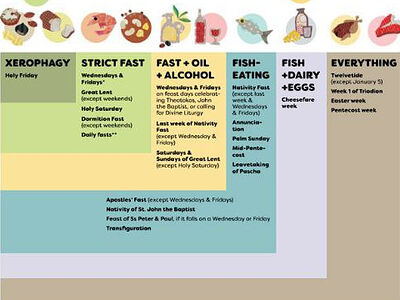Part 1: Let Us Fast in Earnest
Having established a general concept of fasting, having briefly revealed its meaning and significance for us, now, beloveds, let us begin to uncover its essence.
In accordance with our twofold being—bodily and spiritual—the Church has commanded a twofold fast: bodily and spiritual. Let us first discuss the bodily fast.
What is bodily fasting?
Bodily fasting is the measured consumption of food and drink, and fasting food in particular. The Church typikon clearly lays out both the time of consumption and quality of fasting food. And how wisely and lovingly all this is done! Sometimes, when necessary, no food is prescribed at all; sometimes the most meager food is indicated—only bread with salt and water; sometimes fruits and vegetables are provided for; sometimes a type of broth; sometimes just one dish is appointed for a meal, sometimes two; sometimes wine is permitted, and fish on major feasts as well. Everything is strictly calculated, with the aim of weakening the passionate movements of the flesh that are aroused by abundant and sweet eating; but not so as to completely weaken our bodily nature, but, on the contrary, to make it light, strong, and fully capable of obeying the movements of the spirit and energetically fulfilling its demands.
Anyone who has decided to fast according to the precepts of the Church typikon regarding the consumption of food knows from experience all the beneficence and salutariness of the appointed xerography.1 Countless hosts of saints who shone forth in fasting have experienced this. They all strictly adhered to the once-and-for-all prescribed rules and order in the quantity and quality of food. And what then? They were always healthy; they almost never needed treatment; and if they did need it sometime, they were treated by fasting and abstinence; that’s why they lived for a hundred years, performing incredible feats.
So, beloveds, fasting consists in consuming food according to the determination of the Church regarding its quantity, time, and especially quality. During the fast, the faithful should not consume food before noon, should only consume fasting food, and moreover, in moderation; they should abstain not only from all drinks that inflame the blood or gratify the taste, but also from all amusements, games, pleasures, and idle gatherings; in general, everything that arouses sensuality.
It is the duty of every son of the Orthodox Church to preserve the fasts as a Divine institution and as an action or means of worshiping God. The Lord Himself commands: Sanctify a fast (Joel 1:14, 2:15); turn ye even to Me with all your heart, and with fasting, and with weeping, and with mourning (Joel 2:12). For the violation of fasts, the wrath of God befalls families, nations, and kingdoms with great calamities (Ps. 77:29-30, Lk. 21:34). Failing to observe the fasts, disrespecting the laws of the Church, a man can’t be a true son of the Church. Can it be expected that a son of the Orthodox Church who is disobedient in small, external matters should maintain obedience in more important obligations?
Fasting is a necessary means for success in the spiritual life and for attaining salvation; for fasting—depriving the flesh of excessive food and drink—weakens the force of sensual drives. From this it can be seen that fasting has diverse benefits: a) Fasting quickly and clearly shows a man that little is needed for his life, and his health depends not on refined, but on simple food and drink; b) fasting very soon reveals the passions and vices reigning in a man, which he has clung to with his heart, and which his flesh loves most of all; c) fasting makes us capable of prayer and reflection upon God and the Divine. “Whoever fasts prays with a good spirit,” says St. John Chrysostom. In general, fasting is a very powerful means of preparation for all great and saving deeds. This is deeply felt by all prudent and God-loving people, always and everywhere. All the saints very strictly fasted and unanimously advised others to fast.
My beloved listeners! Having understood the essence and grasped the meaning and significance of fasting, let us, of course, as obedient sons of the Church, no longer oppose the Church's teaching on fasting, but resolve to observe all the fasts prescribed by the holy Church, according to its typikon. But we must prepare ourselves for fasting gradually: One cannot become a faster all at once.
Amen.








